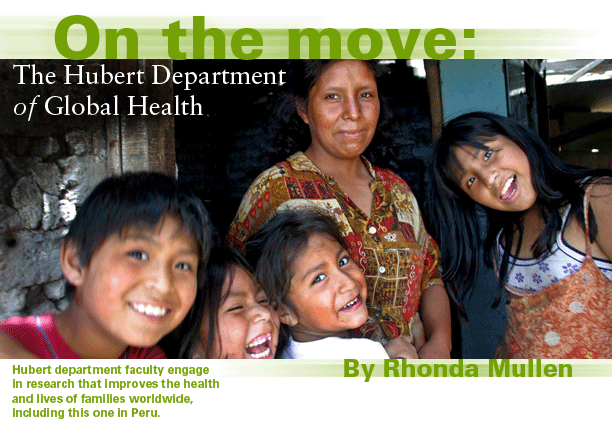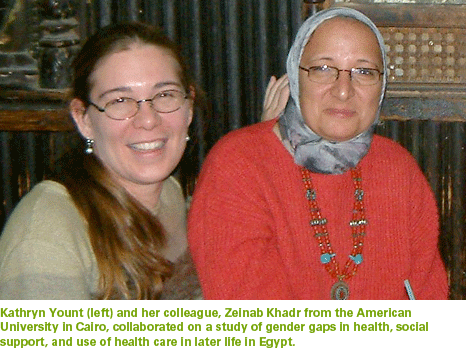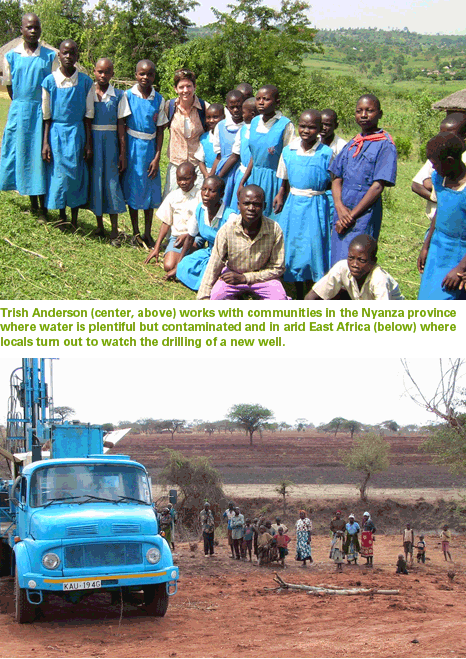












|
 |
| Photo
by Mark Rosenberg |
|
| |
|
|
| |
THE
THREAT OF AN AVIAN FLU PANDEMIC
has set public health professionals scrambling to prepare for what
could be a worst-case scenario, illustrating the complexity and
magnitude of today’s global health challenges. These challenges
require collaboration and expertise not only in understanding the
epidemiology of disease but also in guiding prevention, health education,
and sound health policy—and all this in the context of organisms
that move around the globe with far greater ease than ever before.
And infectious organisms are only part of a global health equation
that touches on every aspect of daily living, ranging from drinking
water and adequate nutrition to political, environmental, and cultural
issues that impact individuals as well as populations as a whole.
In a strategic plan unveiled last
fall, Emory University committed to taking on some of these challenges,
an action that represents no small ambition. Finding solutions to
health problems of global magnitude will require not just resources
and expertise but also creativity, innovation, and courage.
The Rollins School of Public Health
(RSPH) is playing a key role in helping the University realize its
vision, and vital to this effort is the Hubert Department of Global
Health. Following are highlights of the ways this department is
leading the way in this arena and training a whole generation of
others to do so as well. |
|
| |
|
|
| |
Gender
issues in cultural contexts |
|
| |
Last
March, Kathryn Yount found herself at the center of two highly publicized
court cases in Atlanta that involved female genital cutting. This
practice, which occurs in approximately 2 million girls each year,
ranges from the removal of the skin around the clitoris to infibulation,
where the clitoris and vaginal lips are removed and the external
genitalia are stitched together. The trials drew attention to the
presence of this controversial practice close to home, in the immigrant
communities in Georgia.
For her testimony as an expert witness,
Yount drew on evidence from her research in Egypt and from other
national studies. In her study population in Egypt, less severe
versions of this practice have had negligible effects on reproductive
health, but severe practices elsewhere have increased rates of infertility
and stillbirths. Yount’s research has helped policy makers
think about potential health messages for populations steeped in
the ritual and how immigrant practices fit into U.S. and state health
policies. In March 2005, the Georgia legislature passed House Bill
10, creating a specific criminal statute against female genital
cutting of minors.
Yount also has worked on several longitudinal
studies in Egypt that look at the causes of disparities in men’s
and women’s health throughout their lifetimes. In Egypt, being
a man has some important advantages, she says. Her research has
shown a higher risk of mortality among girls, parental discrimination
against daughters in the allocation of food and health care, and
biased care by providers who treat children for diarrheal disease.
Her study demonstrated for the first time potential gender inequalities
in provider care in Egypt. Through new research on older women and
men in Egypt, she now is studying how early-life disparities in
care affect the health and well-being of men and women into adulthood. |
|
| |
|
|
| |
 |
|
| |
|
|
| |
Food
for thought |
|
| |
Hubert
faculty members recently completed research for the most comprehensive
assessment ever of the importance of nutrition for economic productivity.
The findings point to the role of malnutrition on intellectual performance
and physical growth and the resulting impact on an adult’s
economic potential.
After following a study population
in Guatemala for more than three decades, a research team led by
Rey Martorell has shown that improving nutrition in preschool children
not only improves their physical and intellectual development but
also affects their ability to earn a living over the course of their
lifetimes. Research from a follow-up study from 2002 to 2004 carried
out by Martorell, Ari Stein, Rafael Flores, Usha Ramakrishnan, and
others will be published this year, but already a supplement to
Food and Nutrition Bulletin outlines the findings: strong
effects on body size, educational improvements in reading tests
from 10% to 15%, and an 18% increase in lifetime income—all
resulting from a simple nutritional supplement provided to children.
“This study brings more argument
for why governments should invest in children,” says Martorell.
The research in Guatemala is just
one area where the RSPH is making an impact in global nutrition.
Glen Maberly, founder and director of the Program Against Micronutrient
Malnutrition, has been a key leader in an effort to eliminate iodine
deficiency in children in China. |
|
| |
|
|
| |
| |
|
|
| |
Training
the next generation |
|
| |
The
Hubert Department attracts 40% of the applicants to the RSPH,
in part because of the array of choices it offers—joint
programs in environmental health, epidemiology, international
nursing, and global nutrition, to name a few. Mid-level career
professionals can compete for slots in the Hubert H. Humphrey
and Edmund Muskie fellowship programs as well as the William
H. Foege Fellowships in Global Health. (For the Humphrey fellows,
the RSPH offers the only U.S. campus with an AIDS concentration
in the country.) The Peace Corps master’s program at
the RSPH is the second largest in the United States, allowing
students to combine graduate studies with Peace Corps service
to earn a degree. The Center for Health, Culture, and Society
allows students from public health and arts and sciences to
explore the interplay among these disciplines. And the Fogarty
Fellowship Program provides opportunity for public health
and medical professionals from developing countries to do
interdisciplinary research in HIV prevention and care. |
|
| |
|
|
|
|
| |
|
|
| |
Safer
water = saved lives |
|
| |
In
an arid eastern Africa district near Kitui, Kenya, a woman might
walk for hours to get to the river bed. When she arrives there,
the river is dry so she digs down until she finds enough water to
fill her pails with what she can carry. Then she starts the journey
home.
In Nyanza province, there is a different
problem. Here water is plentiful, but it is contaminated by animals,
people, and pollution. Drinking this water contributes to the highest
diarrheal rates in Kenya, accounting for some 20% of deaths in children
under 5.
The Atlanta Rotary Club finds
both of these scenarios troubling. Teaming up with the Center for
Global Safe Water at the RSPH, CDC, and the Rotary Club of Kenya,
the Atlanta club is funding two programs to bring safer water to
Kitui and Nyanza. The first is a project to drill 100 new wells
in eastern Kenya. Although the wells are spread out, still requiring
a walk to reach them, Kenyans at least will have the guarantee of
water rather than a dry river bed when they arrive. The second program
is distribution of a water purifier, WaterGuard, through microbusinesses
run by local community women in Nyanza province. The goal is to
have 1,000 women selling WaterGuard in two years.
Trish Anderson, MPH04, is the project
coordinator for both efforts. When Anderson entered graduate school,
her timing was perfect to join the first group of students to study
global environmental health at the RSPH. Most of her time now is
spent in western Kenya, where she helps women get started in their
own businesses to sell WaterGuard. She also holds training for a
safe water system developed by CDC that involves a purifying method,
storage in safe containers, and hygiene education.
“We are trying to teach rural
women new skills within confines of the culture where one-size-fits-all
business models don’t work,” Anderson says. “These
women are motivated by their role as caretaker as much as if not
more than their need to make a living. Creating profitable and sustainable
businesses with that in mind takes time and patience.”
The partnership with Atlanta Rotary
is just one of the collaborations of the Center for Global Safe
Water. Center director James Hughes and faculty Rick Rheingans and
Christine Moe spearhead a variety of water and sanitation initiatives
from training the next generation of water experts to supplying
technical assistance and scientific advice for the Community Watershed
Partnerships, a national initiative by Coca-Cola for improving water
access and quality abroad. The center is working with CDC to take
its safe water system to new locations in the developing world,
through sanitation research with the El Salvador Ministry of Health,
and with CARE, CDC, and the Coca-Cola Company to expand water education
in 500 schools in Kenya. |
|
| |
|
|
| |
 |
|
| |
|
|
| |
|
|
|
|
|
|



